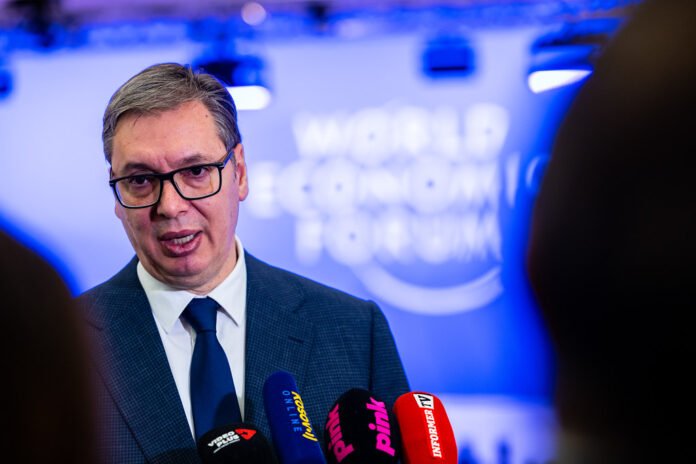In Serbia’s capital, anti-government protesters clashed with riot police near government buildings and Pionirski Park. Demonstrators demanded President Aleksandar Vučić call an early election and end his 12-year rule. The police responded forcefully, resulting in six officers injured and several dozen protesters detained.
Background: Months of Growing Discontent
Since December, Serbia has faced widespread protests after a railway station roof collapse in Novi Sad on November 1, 2024, killed 16 people. Citizens and student groups accuse the Vučić administration of deep-rooted corruption, compromising public safety. Initially campus walkouts, these protests have grown into national demonstrations, occasionally closing universities and rallying farmers, workers, and civil-society activists.
President Vučić’s Serbian Progressive Party (SNS) holds a majority with 156 out of 250 seats in the National Assembly. The next parliamentary elections are set for 2027, coinciding with the end of his second term. Despite increasing pressure, Vučić has steadfastly declined to hold early elections.
Saturday’s Rally: Two Sides of Belgrade
Protest organizers selected the area near the National Assembly, government ministries, and Pionirski Park, a usual spot for pro-government gatherings. By evening, clashes between the groups turned into open conflict.
Protesters demanded immediate elections and the resignation of Vučić, criticizing corruption, media control, and alleged connections between government officials and organized crime. Meanwhile, Vučić’s supporters rallied nearby, displaying SNS flags and his portraits.
Spiral into Violence
Around 10 pm, clashes erupted. Some protesters threw bottles, rocks, and flares at police. In response, riot police moved in, using batons and arresting several individuals. Reuters footage shows a man on the ground, his shirt torn, with officers pressing batons on him. Six officers were injured, suffering from bruises and cuts, as reported by police chief Dragan Vasiljević. He spoke to the media on Saturday night. Interior Minister Ivica Dačić declared that all necessary actions would be taken to ensure public order and safety, warning that any further violence would be met with strong measures.
Protesters’ Defiance and Police Response
Protesters urged officers to keep their riot shields down, calling for restraint. Student leaders from the University Assembly accused the government of deliberately escalating tensions. They claimed, “The government chose violence and repression against the people. They are responsible for every escalation,” as stated on X (formerly Twitter).
Protesters vowed non-violence, yet clashes with police became the fiercest in weeks. Many demonstrators faced arrest for charges like unlawful assembly and assaulting officers.
President Vučić’s Response: ‘They Wanted to Topple Serbia’
President Vučić described the unrest as a failed coup on Instagram, claiming, “They wanted to topple Serbia, and they have failed.” He accused unnamed “foreign powers” of orchestrating the protests, a common theme in his speeches.
Vučić declared on TV that police should be restrained, but violence won’t be tolerated. “The country will be defended, and offenders will face justice,” he stated.
Voices from the Crowd
Sladjana Lojanović, a 37-year-old farmer from Síd, joined the protest, stating that corruption is widespread and institutions are compromised. She believes elections are necessary but doubts a peaceful transition of power.
University student Marko Petrović, a movement organizer, highlighted a fearful atmosphere. “Professors face pressure to avoid supporting us, and parents fear backlash, yet we refuse to remain passive as fundamental freedoms diminish.
Political Stakes and the Path Forward
Serbia faces a major threat to its stability and EU membership goals due to ongoing unrest. Regular protests and harsh policing weaken the rule-of-law standards required by the EU. Despite this, early elections before 2027 are improbable, as the president lacks the authority to dissolve parliament unilaterally.
Opposition parties agree on early elections but are divided on other policies. Some suggest holding parliamentary elections first, then presidential ones in 2027. However, without a constitutional way to dissolve the government early, these ideas encounter significant legal and political challenges.
International Reaction
Western governments urge calm and respect for peaceful assembly. The U.S. State Department calls for avoiding violence and promoting dialogue. The European External Action Service supports Serbia’s EU aspirations, emphasizing the importance of “credible democratic processes” and safeguarding “fundamental rights.
Russia commended Vučić for maintaining order and criticized Western involvement. Analysts suggest Belgrade’s strategic location between East and West enables the president to benefit from both alliances, strengthening his position at home.
Human Cost and Civil-Society Mobilization
Amidst political maneuvers, everyday people suffer most. Businesses in central Belgrade closed early on Saturday due to safety fears. Doctors in city hospitals treated both injured protesters and officers. Legal aid groups rallied to support detainees, while independent journalists recorded alleged police misconduct.
People are fed up with hollow promises and biased justice, declared legal advocate Ivana Popović. They demand openness, responsibility, and the opportunity to shape their own destiny.
Looking Ahead: Will Vučić Hold Firm?
President Vučić’s term lasts until 2027, presenting a long challenge for protesters. The SNS-controlled parliament remains firm, and despite a dip, the president’s approval is still strong, especially among rural and older voters.
Snap elections are unlikely unless the ruling coalition or security forces face a major split. Protest leaders are considering new tactics, such as international legal actions and grassroots efforts to increase voter registration in areas that favor the opposition.
Conclusion
Saturday’s clashes in Belgrade highlighted Serbia’s deepening political divisions. Anti-government protesters demand early elections, while the Vučić administration shows no tolerance for unrest. After months of mass protests, both sides remain firm, potentially leading to a long standoff that could influence Serbia’s path toward and within the European Union.
READ MORE: IDF Opens War Crimes Inquiry as Gaza Aid Zone Death Toll Mounts
